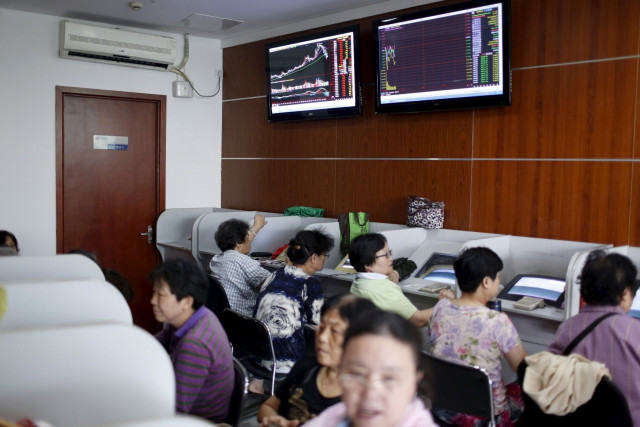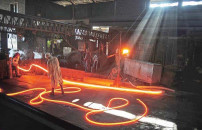China markets plunge again, Hong Kong up on Greece hopes
Slumped as much as 6.38 per cent in late afternoon trade before recovering slightly

Investors look at computer screens showing stock information at a brokerage house in Shanghai, China, July 2, 2015. PHOTO: REUTERS
The benchmark Shanghai Composite Index dropped 3.48 per cent, or 140.93 points, to 3,912.77 on turnover of 736.0 billion yuan ($120.3 billion). It slumped as much as 6.38 per cent in late afternoon trade before recovering slightly.
The Shenzhen Composite Index, which tracks stocks on China's second exchange, plummeted 5.55 per cent, or 130.32 points, to 2,215.81 on turnover of 552.3 billion yuan.
But in Hong Kong the benchmark Hang Seng Index rose 0.12 per cent, or 32.29 points, to 26,282.32 on turnover of HK$150.85 billion (US$19.46 billion).
Chinese markets were among the world's best performers earlier this year, with Shanghai rising more than 150 per cent over 12 months until it peaked on June 12.
But it has since lost a quarter of its value, with the losses largely attributed to fears stocks were overvalued, profit-taking and margin traders unwinding their positions.
"High volatility is a typical sign when the market has hit the bottom level, but even so, this kind of market swing is very rare since it's a liquidity-driven market," Zheshang Securities analyst Zhang Yanbing told AFP.

PHOTO: REUTERS
Interventions including a surprise interest rate cut at the weekend have failed to arrest the declines.
Margin investors only need to deposit a small proportion of the value of their trade, potentially generating bigger profits but also exposing them to bigger losses.
The China Securities Regulatory Commission loosened rules on the practice late Wednesday - after a more than five per cent plunge in Shanghai - removing some limits on minimum deposits.
The new regulations also let investors pay back losses in other ways than forced liquidation of their shares - which could prevent a vicious cycle of falling prices triggering sales.
But Simon Male, New York-based head of Asian equities sales at Auerbach Grayson & Co, told Bloomberg News: "Making it easier to obtain margin financing is only exacerbating the problem. Without fundamental support, the market will remain extremely volatile."
The Shanghai and Shenzhen exchanges also cut transaction fees by almost a third on Wednesday.
Castor Pang, Hong Kong-based head of research at Core Pacific Yamaichi warned: "The government will have to and need to come up with more measures otherwise the market is poised to drop further."
In Shanghai Baoshan Iron & Steel dived 8.73 percent to 7.63 yuan while Gansu Jiu Steel Group Hongxing Iron & Steel slumped by its 10 per cent daily limit to 5.47 yuan.
New China Life Insurance fell 5.85 per cent to 53.41 yuan in Shanghai while China Pacific Insurance gave up 2.77 per cent to 27.72 yuan.
Hong Kong, however, joined other regional markets in a broad advance as Greece prepares for a crucial weekend referendum, while a strong set of US data also provided support.
Dealers are broadly upbeat on the prospects for Greece, despite Tuesday's default, after Athens offered fresh concessions to reach a compromise.
While creditors dismissed the offer - which had been presented just before it defaulted - it provided a glimmer of hope that an agreement could be found.
However, European leaders said they will wait after the Sunday poll, which they have cast as effectively an in/out vote on Greece's eurozone future.
"There has to be a negotiated deal there and I think the market believes there will be at the end of the day despite the drama," Michael Cuggino, a fund manager at Pacific Heights Asset Management LLC in San Francisco, told Bloomberg TV.
In share trading insurance giant AIA rose 1.97 per cent to HK$51.75, Tencent gained 1.16 per cent to HK$156.50 and China Mobile was 1.06 per cent up at HK$100.30.
And Macau casinos surged on reports China had relaxed travel rules on mainlanders visiting the gambling hub.
Galaxy Entertainment rallied 13.27 per cent to HK$35.00 and Sands China soared 12.07 per cent to HK$29.25.



















COMMENTS
Comments are moderated and generally will be posted if they are on-topic and not abusive.
For more information, please see our Comments FAQ